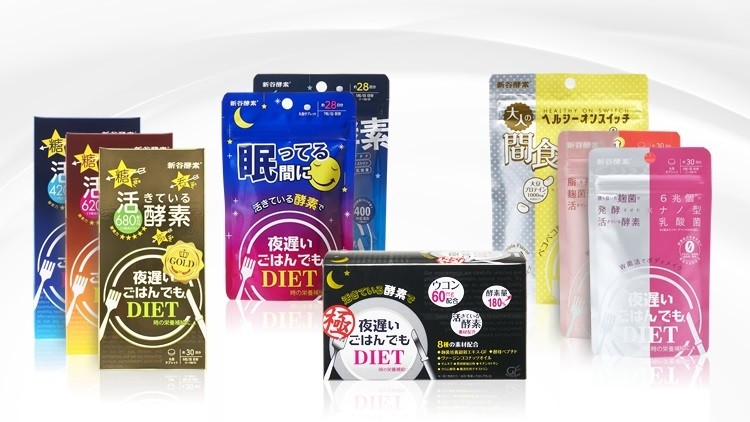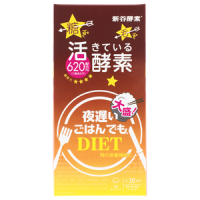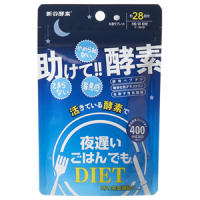‘The market for active enzymes is immeasurable’: Japan’s Shinya Koso on digestive health, weight management trends

Developed by renowned Japanese gastroenterologist Dr Hiromi Shinya, Shinya Koso uses two main types of active enzyme raw materials.
The first type is extracted via fermentation of 10 healthy grains traditionally consumed in Japan, such as germinated brown rice, millet, and Japanese millet.
The second type uses rice as the source of fermentation.
New products are created by blending the two types of active enzymes.
In the past decade, 20 million units of Shinya Koso products have been sold across 19 countries, including Japan, China, and the US.
Some examples of its products include the Daily Digestion Enzymes W Kinkatsu Body Make, launched in Singapore in October 2020, as well as Daily Digestion Enzyme Advanced, and Daily Digestion Enzyme (Beauty Plus).
The company believes that there is growth potential by expanding to new markets and introducing new consumers to the benefits of consuming enzymes.
“Investment to health is not possible without a certain amount of income, so not all countries have been introduced to the product yet. However, it [good health] is certainly the wish of all humankind.
“In that sense, we believe that the market for 'active enzymes' is immeasurable,” said Katsuhiko Iida, CEO of Shinya Enzyme.
Currently, the brand’s existing consumers can be broadly categorised into two groups.
The first group is mainly individuals over 40 years old and are consuming the product to maintain their intestinal health.
In Japan, more consumers are concerned with intestinal health due to the rise of two trends: Chokatsu – a trend of rejuvenating the intestinal function and Kinkatsu – a trend of consuming fungus to rejuvenate the intestines.
“The intestinal health market has been expanding significantly in recent years. However, people will usually associate intestinal health with ingredients such as lactic acid bacteria or Bifidobacterium and are less likely to think of enzymes supplements.
“Therefore, we believe that it is quite critical to promote awareness around the benefits of enzymes,” he added.
The other key consumers of Shinya Koso are women in their early 20s to 40s and are concerned with weight management.
The trend is partly driven by COVID-19.
“Due to COVID-19, people seem to have reduced their exercise routine, and so we believe that the demand for supplements for healthy weight loss, such as removing unhealthy fats, will continue to increase."
New products
The company is exploring other types of ingredients apart from active enzymes for its new product development.
Three types of ingredients have been shortlisted, namely 1) probiotics, 2) biologicals such as short-chain fatty acids including acetic acid, butyric acid, and probionic acid, and 3) gluconic acid to increase the amount of Bifidobacterium.
It is also exploring the combination of proteins and enzymes for promoting general wellness.
The company has already developed new protein products related to aged cared and also started developing “further activated” enzyme materials.
This means that the dosage amount could potentially be reduced.
At the moment, some of its products require dosage of six to seven tablets each time. In this case, it is exploring the possibility of creating its products in granules to reduce the burden of having to take several tablets each time.
How it started
Shinya Koso was developed by Dr Hiromi Shinya, who is known for his groundbreaking work in establishing endoscopic surgery.
In his clinical practice, he examined the gastrointestinal tract of 350,000 individuals and found that the gastrointestinal tract of healthy individuals was pink but those with health problems have a darkened gastrointestinal tract.
Based on the findings, he came up with a disease prevention and health theory known as “Shinya Biozyma”.
The theory believes that the secret to a youthful and healthy life is through maintaining a healthy gastrointestinal tract via good diets and living habits.
According to the theory, “good diets” would be rich in active enzymes as they are indispensable for digestion in the small intestine.
Other good diets include those rich in dietary fiber to provide good gut bacteria with food and beneficial bacteria such as lactic acid bacteria and Bifidobacteria.
However, as enzymes are sensitive to heat and could be destroyed via normal cooking, he then spent 14 years to formulate Shinya Koso, in which enzymes could be taken as a supplement.
“By keeping the intestinal environment healthy, the immune system becomes healthy, because about 60 per cent of the immune cells exist in the intestinal tract and it is also important for mental health.
“It has been shown that intestinal flora plays a role in mental illness and that the ‘cerebral intestinal cooperation’ [otherwise known as the gut-brain axis] is critical,” said Iida.
























